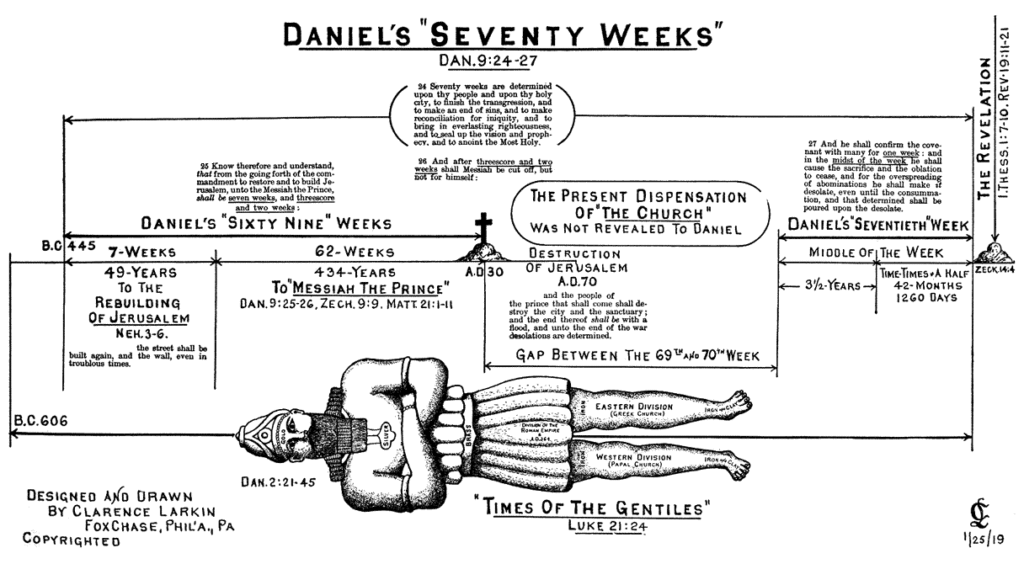On September 23rd, 2025, the Rapture failed to happen. Again. Yet another totally-divine prophecy from Jesus turned out to be a false alarm. Thankfully, though this one blew up on TikTok and YouTube, it didn’t go nearly as far as some previous ones did.
But what of the aftermath for those who took it seriously? It can be such a defeating feeling to wake up and not see Heaven—and to know beyond all shadow of a doubt that the Rapture didn’t happen after all. Today, let me take Rapture believers by the hand and gently guide them through their post-prophecy malaise.
(This post and its audio ‘cast first went live on Patreon on 9/26/2025. They’re both available now! From introduction: John Hagee’s big Blood Moon Rapture prediction; the 2023 prediction that also failed.)
SITUATION REPORT: Y’know that Rapture thing that never happens? Well, it didn’t happen again
Despite yet another Rapture prediction, September 23rd came and went without fanfare. I’d figured as much when we talked about it last week.
One by one, every time zone on Earth slipped past midnight. One by one, each time zone whispered the defeat of yet another attempt to predict the end of the world as we know it.
And we feel fine, to paraphrase the great bards.
If you’ve ever been through one of these panicky predictions, then oh, you’ve been through a million of them. They are all alike. Tight webs of numerology and Bible verses and modern headlines and diagrams and Jewish holidays, all muddled together like the world’s worst mojito to produce a single date. That date marks when Jesus is totally finally gonna get his lazy ass in gear.
But he didn’t.
In fact, he never has. Christians have waited for the “Endtimes” for 1800ish years now. And for the “Rapture” in particular for at least a couple of centuries.
But if you’re one of the disappointed sheep who woke up on Earth on September 24th, then you, my friend, are in luck.
Here is Captain Cassidy’s all-singing, all-dancing guide for how to deal with it all.
Step One: Grieve what could have been (yet somehow never is)
I know that empty hollow feeling of a fizzled Rapture prediction. My time in Pentecostalism began with a Rapture scare! “88 Reasons” dominated our minds for a good two years before we finally had to face the facts about it not being real.
Grieving in general is about the loss of what might have been, and that’s certainly true here. The Rapture didn’t happen. That means that believers are not in Heaven right now. They’re not missing the Tribulation and the last war, Armageddon. They’re still on Earth, where they have to slog through every day like everyone else.
It’s okay to feel sad. It’s also okay to feel elated too, especially if you’re a young adult who hasn’t done much in life yet—making the failed prediction a sort of reprieve. I know that feeling too. I was 18 when the “88 Reasons” scare hit its last peak. Part of me was exhilarated over the idea of being whisked to Heaven, but another part of me was also sad that I’d never get married, have a real job, travel, or do any of the other stuff I wanted to do in adulthood. I felt guilty about being sad, but nobody needs to feel guilty here.
We’re humans, so we can think about possibilities even if they’re completely impossible. We’re likely the only species on Earth who can think in complex terms about what-can-never-be. But our sadness over something that’s flown out of grasp, that’s gone, that won’t come back, joins us to something even greater—it makes us one with a great many other species. Memory of the loss of what-once-was is part of life itself. It’s okay to mourn.
Step Two: Figure out what the Rapture actually is
First, a loose definition: The Rapture is a magical event that some Christians think will occur Any Day Now™. When it happens, Jesus will whisk all true believers up into Heaven to be with him. They don’t actually die to get there, though. Instead, they just pop into Heaven. Rapture believers derive most of their ideas about it from 1 Thessalonians 4:16-17:
For the Lord himself will come down from heaven, with a loud command, with the voice of the archangel and with the trumpet call of God, and the dead in Christ will rise first. After that, we who are still alive and are left will be caught up together with them in the clouds to meet the Lord in the air. And so we will be with the Lord forever.
If we consider “the body of Christ” as a real body, then the Rapture is part of Christianity’s so-called “junk DNA.” And like our bodies’ vast amount of it, it has a very strange, hard-to-perceive effect on how the religion functions.
Christianity was born amid the furious apocalypticism of 1st-century Judea. It began as a fever-dream of revenge against the Romans who occupied and owned the region. Of course, Church leaders had to tame the wilder aspects of their faith when that fantasy failed to come true in the religion’s earliest days—especially when the Romans destroyed the Second Jewish Temple in 70 CE.
But that element of excitement over the Endtimes and Jesus’ glorious return to Earth got baked early into the religion. It was always just ” this close to bubbling up again. So Christians have experienced panic after panic about Jesus’ second coming and the end of the world. Once one scare ends, another soon enters the religion.
The Rapture, at least as evangelicals know it, is an add-on module that entered the Christian game relatively recently. Historians usually attribute the idea to John Nelson Darby, a preacher active in the early 1800s. Darby was a major figure in the field of dispensationalism, which holds that Earth’s history is divided into grand eras marked by humanity’s distinct and different styles of engagement with Yahweh. Clarence Larkin (1850-1924), who drew my favorite Endtimes diagram of all time, was a dispensationalist.

Over time, Darby’s teachings caught on—especially in America in the later 1800s, and especially his idea of the Rapture occurring before the really nasty Endtimes stuff starts happening, a seven-year period Rapture buffs know as the Tribulation.
The evolution of the Rapture into an evangelical fringe belief
These days, the concept of the Rapture as evangelicals know it is largely an American thing. Originally, it was more fundamentalist than evangelical—but then the two flavors fused together in the 1990s. So now you can find plenty of evangelicals who buy into the idea of being insta-zapped into Heaven.
Even over at hardline evangelical sites, you can find essays that have to step carefully around rejecting the Rapture because so many evangelicals believe it’ll really happen. Even “Rowdy” John Piper believed in the idea at one point before mealy-mouthing a whole new way to view those two Bible verses.
(He decides that what really happens isn’t getting zapped up into the air to meet Jesus and then heading up to Heaven, but apparently zapping into the air, meeting Jesus, and then returning back to Earth with him. Finally! Something sensible at last!)
In summary, the Rapture as modern evangelicals understand it doesn’t appear in Christianity until the 1800s. Despite Christian leaders having access to the Bible since its earliest decades, nobody thought those two verses in 1 Thessalonians meant a literal zapping-into-the-air until the 1800s. Even Christian leaders who bought completely into the idea of the Tribulation didn’t imagine that.
But it doesn’t matter how many Christian leaders and forum spaces try to gently debunk Rapture beliefs. Something about it remains incredibly compelling to many modern evangelicals.
Step Three: Figure out what in your head made the Rapture so appealing as a concept
If Heaven represents a sorta-solution to humans’ fear of oblivion after death, then the Rapture might represent a similar sorta-solution to humans’ fear of aging and dying.
When I was Christian, I knew so many aging Pentecostals who counted on the Rapture to save them from knowing the fear and pain of death. They’d gleefully tell people that they expected Jesus to return (and Rapture his best followers) before they died. They weren’t willing to bet the farm on specific Rapture prediction dates, no, but they did expect it to happen within their lifetimes. According to Pew Research, as of 2022 almost 40% of US adults think we’re already living in the Endtimes—and when we look only at evangelicals, that percentage rises to 63%!
Long after I deconverted, I heard that many evangelical parents apparently desperately hoped the Rapture would happen before their kids started driving. That deadline seemed really weird till I considered how worried these parents must be about their kids’ safety at that critical time.
I was only a teenager when I got caught up in the “88 Reasons” Rapture scare (which predicted Jesus’ return in 1988). So I hadn’t done much of anything and didn’t have a general fear of the future. Instead, my main fear was facing the Tribulation. Nobody in my peer group wanted to be “left behind” after the Rapture to face those terrifying years of persecution and death!
It might be worth asking why the idea of missing the Rapture is so scary. If it’s not a real thing that could ever happen, then what about it so effectively seizes the minds of those who believe in it anyway? Is it a fear of missing out (FOMO)? Or something even scarier looming in the future that one hopes to avoid? Or even worse, is it perhaps a fear of being rejected by Jesus himself?
Once you work that out, then you’re ready to see who benefits from reeling you in like a prize fish.
Step Four: Recognize who benefits from your Rapture hysteria (hint: it ain’t you)
Anyone who’s been evangelical longer than about ten years of adulthood has been through some kind of Rapture scare. So any long-time evangelical pushing Rapture blahblah knows damned well about all the other failures. Harold Camping certainly knew about the ones that had come before his own 2011 predictions—especially since at least one of those earlier failures (in 1994) was his own!
As I mentioned, not many older evangelicals get amped enough about these scares to sell their houses and head out to preach salvation to the heathens. No, those older evangelicals know better. They’ve experienced so many scares already. But grifters know there’s always a new crop of young adult evangelicals who can be easily confused and frightened by that kind of talk.
So I don’t blame a 20-year-old who panicked cuz a TikTok influencer or AI slop-creating YouTuber put together a flashy video of convincing-sounding numerology. They’re too young to really know about the other scares. I blame instead the peddlers of these scares—like the most recent one, “Pastor Joshua.” He’s a literal who from South Africa. His prediction of September 23rd 2025 only became the newest failed scare.
For those who buy into these predictions, each new scare leaves only upheaval in its wake—along with more mockery and a growing distrust of Christians themselves. If Rapture believers made pests of themselves trying to convert their friends and loved ones, they’ll also face relationship issues. (Ask me how I know.) Of those converts, most will leave after the Rapture fails to materialize—and they will remember being burned by the false prediction.
Really, the only people who benefit from Rapture panic are those selling it to evangelicals. With their Endtimes-focused series Left Behind, hucksters Tim LaHaye and Jerry Jenkins have made many millions off of frightened evangelicals. So have countless other opportunists.
No, they won’t pay the costs incurred by their followers. They’ll face none of the fallout, either. According to a recent Cosmopolitan article, many of social media creators are already quietly deleting videos about this latest failure from their social media accounts. (Too bad for any YouTubers trying the same, though. I archived off all of the most-watched videos with PreserveTube. ARCHIVE EVERYTHING, folks.)
It takes a lot for evangelicals to hold anyone accountable for crimes they commit—for non-criminal deeds, it’s almost impossible for them to do so. Even Harold Camping only faced a smidgen of accountability after his spectacularly-failed last prediction in 2011.
(This is a good place to mention my friend Zeke Piestrup’s epic documentary about Harold Camping. See it here!)
Step Five: Live your one shot at life on Earth like you fookin’ stole it
It’s weird how Rapture believers keep saying that atheists think life is meaningless. In truth, they have the lowest imaginable opinion of life on earth. Their lifetime is nothing but a Green Room: A waiting room where they can prepare themselves for the main show of eternity-in-Heaven. So it seems to me that they’re the ones who think life is meaningless!
Rather, atheists know this is all we get. This is our one shot. For a very few eyeblinks of time, a packet of DNA animated a sack full of cells so they could cooperate together for a while. Soon, that packet will end us as well. Our cells will dissolve back down into molecules and atoms that will, in turn, return to the good dark earth.
When that happens, those molecules and atoms will become part of something else. Maybe they will be able to look back at the universe as it looks upon them. In time, anything could happen. Maybe one day a DNA packet will assemble those bits and pieces into another form! Perhaps the packet’s carrier will even gaze upward with human eyes and feel the swift sweep of synapses sparking human wonderment at it all.
The time we have as this particular collection of matter carrying this particular packet of DNA is not infinite. Nothing is. We have no assurances at all that once people’s brains fall apart, anything remains of their consciousness. No evidence points in that direction. It points instead at the glorious finite nature of life: that short time when we spark and burst into flames, burn briefly but so hotly, and finally extinguish, leaving behind ourselves only smoke and ash.
What I’m saying is, drive your life like you stole it. Live like you defeated a thousand other contenders who wanted those brief years for themselves. Fly like you earned your wings. Drive like your car could belong to nobody else.
Because in a very real sense, that’s exactly what’s going on here.
NEXT UP: Our next Alpha Course review! See you soon! <3
Please support my work!
Thanks for reading, and thanks for being part of our community! Here are some ways you can support my work:
Endnote.
How will you steal your life back?



0 Comments